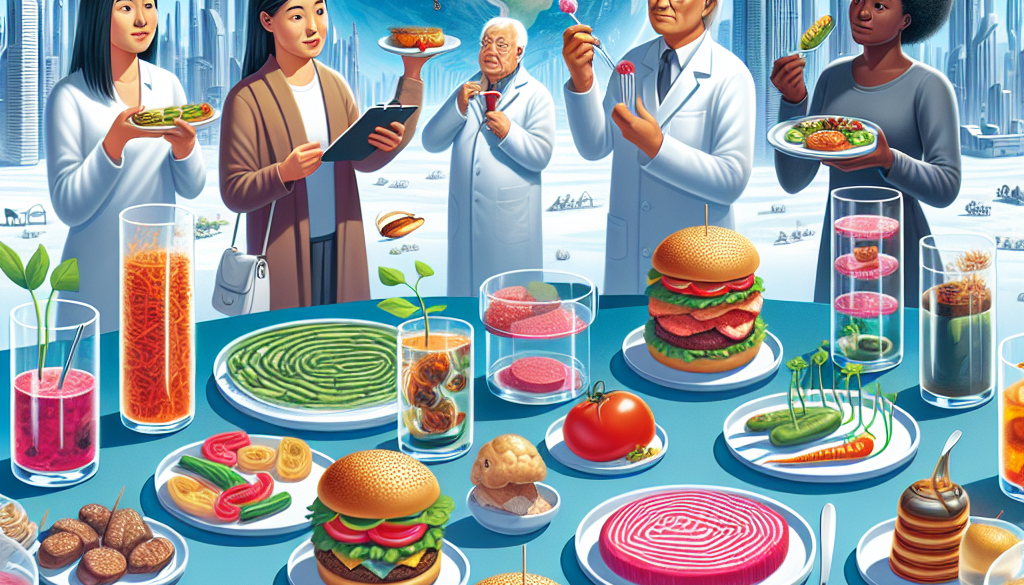Embracing Alternative Proteins for a Sustainable Future
-
Table of Contents
- Alternative Proteins: Paving the Way for a Sustainable Future
- The Environmental Impact of Traditional Protein Sources
- What Are Alternative Proteins?
- The Benefits of Embracing Alternative Proteins
- Challenges in Adopting Alternative Proteins
- Statistics Supporting the Shift to Alternative Proteins
- Case Studies: Success Stories in Alternative Proteins
- Conclusion: The Future of Protein is Here
- Embrace ETprotein’s Sustainable Protein Solutions
Alternative Proteins: Paving the Way for a Sustainable Future

The global population is projected to reach nearly 10 billion by 2050, and with it comes an increased demand for food, particularly protein. Traditional sources of protein, such as meat, dairy, and eggs, place a significant strain on the environment. The search for sustainable alternatives has led to a burgeoning interest in alternative proteins. These novel sources of nutrition not only promise to alleviate the environmental burden but also offer health benefits and new economic opportunities.
The Environmental Impact of Traditional Protein Sources
Conventional animal agriculture is a major contributor to greenhouse gas emissions, deforestation, water scarcity, and biodiversity loss. According to the Food and Agriculture Organization (FAO), livestock farming is responsible for 14.5% of all anthropogenic greenhouse gas emissions. The production of one kilogram of beef can require up to 15,000 liters of water. These statistics highlight the urgent need for more sustainable protein sources.
What Are Alternative Proteins?
Alternative proteins are derived from plants, microorganisms, and other non-animal sources. They are designed to replicate the taste, texture, and nutritional value of animal proteins while minimizing environmental impact. Some popular alternative proteins include:
- Plant-based proteins (e.g., soy, pea, rice, and legumes)
- Cell-cultured or lab-grown meats
- Edible insects
- Algae and seaweed
- Fermented proteins (e.g., tempeh, seitan)
The Benefits of Embracing Alternative Proteins
Switching to alternative proteins offers numerous advantages:
- Reduced Environmental Footprint: Alternative proteins generally require less land, water, and energy to produce than animal proteins.
- Health Benefits: Many alternative proteins are high in fiber and nutrients while being lower in saturated fats and cholesterol.
- Food Security: Diversifying protein sources can help buffer against food shortages and price volatility associated with traditional livestock farming.
- Economic Opportunities: The alternative protein market is growing rapidly, offering new business ventures and job prospects.
Challenges in Adopting Alternative Proteins
Despite their potential, alternative proteins face several challenges:
- Consumer Acceptance: Taste, texture, and cultural preferences can hinder the adoption of alternative proteins.
- Regulatory Hurdles: Novel foods often require extensive safety testing and regulatory approval before they can enter the market.
- Scaling Production: Scaling up production to meet global demand while maintaining quality and affordability is a significant challenge.
Statistics Supporting the Shift to Alternative Proteins
The alternative protein sector is experiencing exponential growth. The plant-based meat market alone is expected to reach $35.4 billion by 2027, growing at a compound annual growth rate (CAGR) of 15.8% from 2021 to 2027, according to a report by Meticulous Research. Moreover, a study by the Good Food Institute revealed that sales of plant-based foods that directly replace animal products have grown 29% in the past two years in the U.S.
Case Studies: Success Stories in Alternative Proteins
Several companies have made significant strides in the alternative protein space:
- Impossible Foods and Beyond Meat: These companies have popularized plant-based burgers that closely mimic the taste and texture of beef.
- Memphis Meats: A pioneer in cell-cultured meat, working to bring lab-grown meat to consumers with a smaller environmental footprint.
- Entomo Farms: Specializes in farming edible insects, offering a high-protein, low-impact food source.
Conclusion: The Future of Protein is Here
The transition to alternative proteins is not just a trend; it’s a necessary shift towards a more sustainable and resilient food system. By embracing these innovative sources of nutrition, we can reduce our environmental impact, improve global health, and ensure food security for future generations. The key takeaways from this article emphasize the importance of alternative proteins in achieving a sustainable future.
Embrace ETprotein’s Sustainable Protein Solutions
For those looking to incorporate alternative proteins into their diets or product offerings, ETprotein provides a range of high-quality, organic bulk vegan proteins. Their selection includes rice protein, pea protein, and various seed proteins, all characterized by a neutral taste and non-GMO, allergen-free attributes. ETprotein’s L-(+)-Ergothioneine (EGT) products also offer purity levels over 98%, catering to industries such as nutraceuticals, pharmaceuticals, and food and beverage.
ETprotein’s commitment to sustainability and quality makes them an ideal partner for businesses and consumers alike. To explore their offerings and learn how they can support your protein needs, contact ETprotein and email sales(at)ETprotein.com today.
About ETprotein:
ETprotein, a reputable protein and L-(+)-Ergothioneine (EGT) Chinese factory manufacturer and supplier, is renowned for producing, stocking, exporting, and delivering the highest quality organic bulk vegan proteins and L-(+)-Ergothioneine. They include Organic rice protein, clear rice protein, pea protein, clear pea protein, watermelon seed protein, pumpkin seed protein, sunflower seed protein, mung bean protein, peanut protein, and L-(+)-Ergothioneine EGT Pharmaceutical grade, L-(+)-Ergothioneine EGT food grade, L-(+)-Ergothioneine EGT cosmetic grade, L-(+)-Ergothioneine EGT reference grade and L-(+)-Ergothioneine EGT standard. Their offerings, characterized by a neutral taste, non-GMO, allergen-free attributes, with L-(+)-Ergothioneine purity over 98%, 99%, cater to a diverse range of industries. They serve nutraceutical, pharmaceutical, cosmeceutical, veterinary, as well as food and beverage finished product distributors, traders, and manufacturers across Europe, USA, Canada, Australia, Thailand, Japan, Korea, Brazil, and Chile, among others.
ETprotein specialization includes exporting and delivering tailor-made protein powder and finished nutritional supplements. Their extensive product range covers sectors like Food and Beverage, Sports Nutrition, Weight Management, Dietary Supplements, Health and Wellness Products, and Infant Formula, ensuring comprehensive solutions to meet all your protein needs.
As a trusted company by leading global food and beverage brands and Fortune 500 companies, ETprotein reinforces China’s reputation in the global arena. For more information or to sample their products, please contact them and email sales(at)ETprotein.com today.












